Glimpses of serenity at Batatota cave temple
By Mahil Wijesinghe
The undulating terraces of tea bushes provide a sight of luscious
greenery. Tea pluckers with baskets on their backs move from bush to
bush, plucking a leaf and a bud from each bush, and dropping them with
lightning speed in their baskets. This is a common sight upcountry. At a
particular point, the Adam’s Peak can be seen rising through the mist.
|
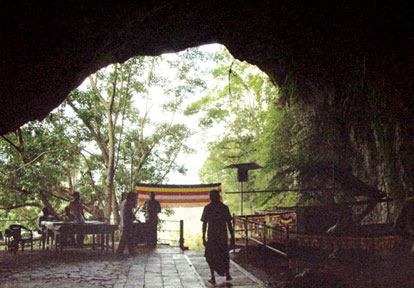
The view from the cave |
The sleepy village of Erathna, a mountainous hamlet, lies just 20
kilometres from Kuruwita. Nature has blessed this village and one can
see the profusion of wilderness on all sides. It is on the foothills of
Sri Pada or Adam’s Peak.
There is an arduous, but adventurous route to Sri Pada from Erathna.
It leads to the summit through the wilderness. Pilgrims to Sri Pada take
this route because it provides them the opportunity to experience the
natural beauty of the country and the salubrious climate of the area.
Most of the villagers of Erathna make a living through small-scale
tea plantations and by producing jaggery from the Kitul palm. The
abundance of Kitul palms in Erathna has enabled villagers to make Kitul
jaggery as a means of livelihood. Having travelled eight kilometres on
the narrow Kuruwita - Erathna road, we reached a small junction called
Batatota. We then proceeded another one-and-a-half kilometres on the
steep incline and arrived at a car park right in the centre of the
incline.
Vertical steps
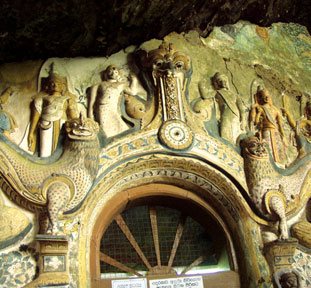
The impressive Makara Thorana |
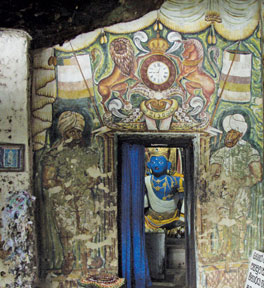
The Vishnu Devala in the cave |
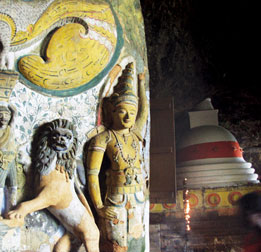
The Makara Thorana and Stupa |
From the car park, just over a quarter of a kilometre away, the
neatly built vertical steps flanked by vendors on both sides lead to the
Batatota cave temple, which is also believed by some to be the ancient
site of Diwaguhawa. The site is not only famous for its ancient
monastery, but also for its majestic dagaba and ancient murals. What
appeals to visitors is the wilderness and the panoramic view of Sri
Pada, which is about 15 kilometres from the east of this spot.
The Batatota cave temple, which was once neglected, has now earned
fame as a religious site. It is revered by Buddhists in Sri Lanka.
During weekends and holidays, hundreds of visitors throng this ancient
cave.
A spacious car park has been built on the mountain, just below the
cave temple, for visitors. Since the spot has gained popularity,
villagers make a livelihood, selling Kitul jaggery and hand-made
souvenirs to visitors who trek to the sacred precincts. The road to the
cave is lined by these vendors.
Religious significance
Considering the religious significance of the spot, the Batatota
Ancient Cave Temple Renovation Society was set up and a program to
renovate the cave temple was launched.
In the cave shrine, several cross-legged and a single reclining
Buddha statue can be seen. However, it is difficult to ascertain the
period to which they belong. Most of the statues and paintings in this
cave temple have been renovated several times. The paintings have also
been touched up at different times.
The isolated cave was rediscovered in 1908 by Sri Subethi, an erudite
bhikkhu who took great efforts to renovate it and built a devala, a
place where religious rites are held for gods outside the shrine. After
the bhikkhu’s demise, the site was again abandoned.
It has become a haven for treasure hunters. On an earlier visit in
2005, we found that some of the statues had been destroyed by treasure
hunters. However, on a recent trip, we found the vandalised statues
restored to their pristine glory.
In 1995, Ven. Balangoda Ananda Maithreya Mahanayaka Thera again
identified this ancient cave temple as the Diwaguhawa. It is now a
famous Buddhist site among devotees who make an annual pilgrimage to the
Sri Pada, via the Erathna route.
A remarkable feature is the water dripping from the rock ceiling,
even during spells of dry weather. A pond has been built in the centre
of the cave in which a figure of a frog has been created. The water
drips into the pond. When it is sunny, rays of sunlight fall inside the
cave. From atop the hill, the view is breathtaking. It has now turned
into a picnic spot and to some extent, its religious significance has
been lost.
Guardian of Sri Pada
Apart from the Batatota cave, Sthreepura, another cave is found just
200 metres away. This cave is believed to be the shelter of a relative
of God Saman, who is said to be the guardian of Sri Pada.
The Adhivasi community is of the view that this cave belonged to
their forefathers. Adhivasi Chief, Uruwarige Wanniyale Aththo regularly
participates in the ceremonies that are organised at the Batatota cave
temple. The Adhivasi community believes that they have a link to God
Saman. A devala has been built and dedicated to God Saman in the
Mahiyangana temple, and is close to the native land, Dambana of the
Adhivasi community.
|
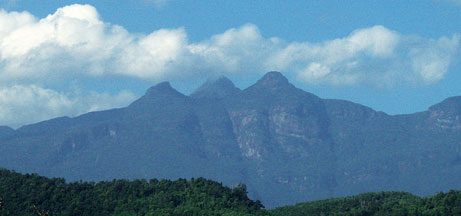
The panoramic view of Sri Pada |
Legend has it that this cave temple was built by King Nissankamalla
during the Polonnaruwa era and during this time the king had
accidentally discovered the cave on his way to Sri Pada. The Buddha
rested there with 500 of His disciples, on His return from the Sri Pada
peak. Legend also has it that the Buddha rested in this cave after
placing His footprint on the Sri Pada on the invitation of God Saman.
It is said that King Nissankamalla visited this cave temple during
his religious expedition to Sri Pada. He built the temple which
showcases the country’s rich culture. The most impressive architectural
feature in this cave temple is the Makara Thorana that dates back to the
Polonnaruwa period. A part of it has been renovated by villagers as it
had been disfigured. Some of the paintings on the wall of the cave
relate to the colonial era which has an emblem of the British throne
above one of its doors in the cave.
Although the original architectural design of the cave temple is not
visible at present, the ancient trees of the area surrounded by
different kinds of vegetation can be seen. Flowers are in full bloom,
displaying the ancient grandeur of the area. |


